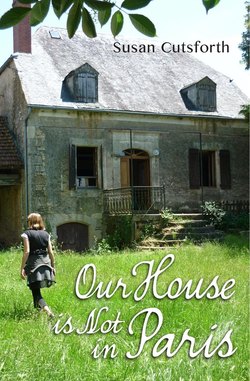Читать книгу Our House is Not in Paris - Susan Cutsforth - Страница 20
На сайте Литреса книга снята с продажи.
Days of Renovating
ОглавлениеThe long days continued but the hard work was immensely rewarding. Stuart’s mornings were usually consumed by bricolage and supermarché trips, to the point that I actually did all the sanding of the beams and window and doorframes. I also rapidly developed new renovating skills, such as stripping paint off wood — very challenging indeed. One of my best memories was a Monday morning when Stuart was out and my first task was to take the wallpaper and plaster down. As I did, I uncovered some beautiful old wooden beams. It was a very exciting moment to carefully peel it all away and bring the old farmhouse back to life. It was also lovely to find out the old owners, who stayed in the house into their eighties, were both very much liked and respected in the village. Perhaps that’s why there was such a warm feeling in the house, and it also felt that the petite maison itself felt happy being brought back to life.
On the last few days of our first trip, we started to frantically tackle the garden. A huge job was wrenching all the ivy and growth off the back of the barn. Meanwhile, I cleared some of the beds and unearthed some struggling little roses behind the barn. No trips to garden centres were needed, though; instant mulch was the hay stored on top of the carport while I just gathered moss-covered old rocks to edge my beds. Much to my horror, I encountered a snake while pruning the wisteria outside the barn. While not venomous, it was still hugely unnerving — especially as I’ve had more than my fair share of ‘close snake’ encounters at home, including in our house! Who else has come home from work to the utter horror of discovering a snake curled up inside a rug? As if that wasn’t terrifying enough, I’m sure that I am the only person in the world to go on holiday and then find, to their utter horror, a snake curled under the rim of the toilet. Mind you, I also gave up the offer of an afternoon relaxing by Jean-Claude and Françoise’s pool to continue my feverish work. And so, on our very last day of frantic activity, a snake to taint our piece of paradise.
The days here are punctuated by the village church bells, marking the rhythm of the day in a markedly different way than at home. The bells start at seven and finish at ten. What is particularly lovely is that there is a longer pealing at midday to signal the downing of tools at the start of the oh-so-very civilised two-hour lunch break. This happens again at five to mark the end of the working day. Or, in our case, a glass of delicious French wine to revive us to continue working. Some nights we laboured so long and hard — and here we were in the land of the most phenomenal food imaginable — that often our evening meal was bread-on-the-run and another glass of rosé. Hard to believe looking back, but so frenetically where we working that it seemed simply too hard to prepare a meal.
Another delightful measure of each day is that, as the sacrosanct lunch hour approaches, the white vans of all the local tradesmen start whizzing by in search of the nearest village restaurant at which to relax and enjoy their lunch. Many times we would be working away and, if we glanced out the window while up a ladder or stripping wallpaper, we would see the scurrying convoy of white vans and know without checking that it was nearly time for lunch. Brigitte and Erick, who are from the south of France, told us the tradition was dying out there and it is now only prevalent in rural areas. Long live the two-hour lunch break, we say. Not that we were always able to take advantage of it, but the mere thought of it is one of the most enchanting aspects of a culture so very different to ours. And, oh, the days when we could enjoy it and go to a restaurant were special days indeed. The delight of plat du jour or the fixed-price three-course menu (which often included a glass of wine) never ceased to fill us with pleasure. Are there any more splendid words in the world than ‘Bon appétit’?
The end of the day can be measured too by a neighbour calling her cat. Again, no clocks were needed as, on the dot of 10pm, we would hear her call, ‘Pooki, Pooki,’ — or something very similar. We have yet to see either our neighbour or her cat. On most evenings, too, someone nearby would play the piano, its sound drifting across the garden.
